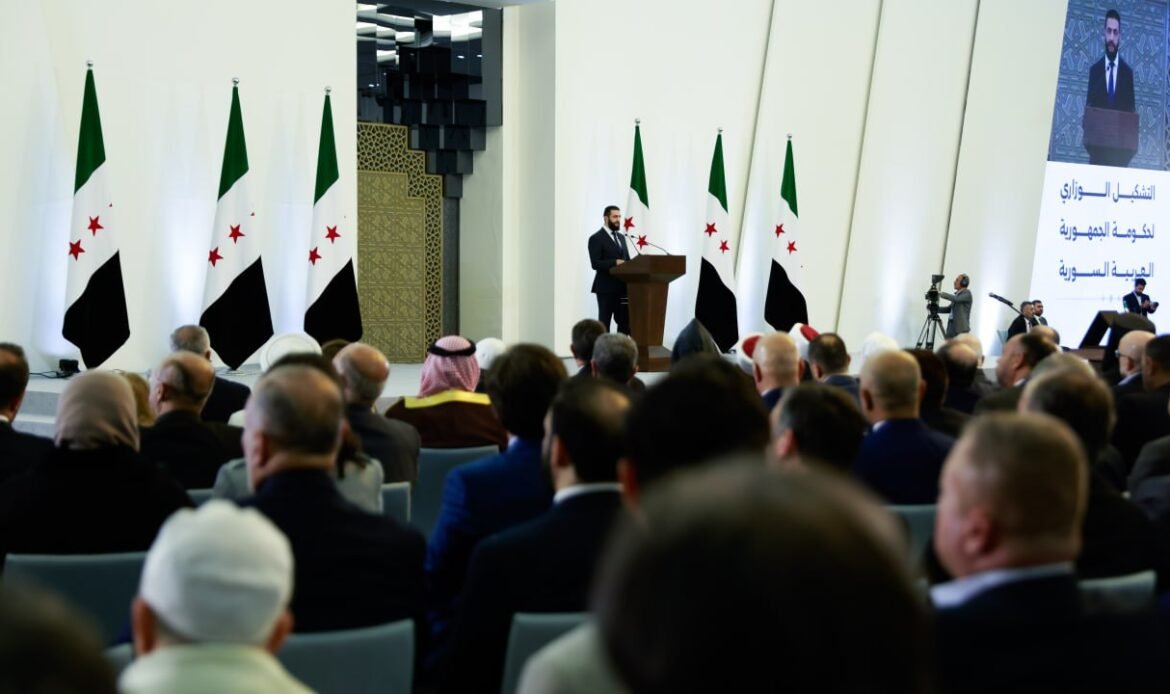The New Syrian Government Through the Eyes of Western Media: A Temporary 5-Year Term Without a Prime Minister and a Host of Challenges
The birth of the new Syrian government, set to serve as the executive team for a transitional phase outlined by Syrian President Ahmed al-Sharaa for five years, has sparked reactions from Western newspapers. Notably, this government lacks the position of a prime minister, a detail that has drawn significant attention. Below, we explore how prominent Western media outlets have interpreted this development, shedding light on the challenges and expectations surrounding this transitional administration.

The Wall Street Journal: A Bid for Legitimacy Amid Shifting Power
The Wall Street Journal reported that the announcement of the new government came at a time when Syria’s leadership, under Ahmed al-Sharaa, is striving to “gain acceptance both domestically and internationally.” The newspaper emphasized that this move reflects Damascus’s efforts to bolster its legitimacy following the ousting of former President Bashar al-Assad nearly four months ago.
Moreover, the journal noted, “Syria’s rulers—led by Islamist factions—formed a new transitional government on Saturday, incorporating a number of competent technocrats.” This step, according to the publication, is part of a broader strategy to stabilize the country and project an image of capability to the world, despite the complex political currents at play.
The New York Times: A Test of Rebel Promises and Representation
Meanwhile, The New York Times highlighted that the selection of government members serves as a litmus test for the commitment of those it referred to as “rebels”—the forces that toppled Bashar al-Assad—to their pledges of establishing an inclusive government representing all Syrians. The newspaper described the swearing-in ceremony of the new ministers at the presidential palace overlooking Damascus, pointing out the inclusion of experienced officials and one woman, while close allies of al-Sharaa retained sensitive portfolios such as defense, foreign affairs, and interior.
Additionally, the Times viewed this formation as “a partial response to pressures from Syrian society, minorities, and international demands for lifting sanctions.” For instance, the appointment of activists like Raed al-Saleh (leader of the White Helmets) as Minister of Disasters and Hind Qabawat (organizer of the National Dialogue Conference) as Minister of Social Affairs, alongside a Kurdish appointee as Minister of Education, was seen as a symbolic gesture toward the Kurdish minority and a signal of broader representation.
The Independent: Stability Efforts in a War-Torn Nation
On the other hand, The Independent focused on the new authorities’ efforts to restore stability in a war-weary Syria. The newspaper observed that the government reflects a religious and ethnic mix but operates without a prime minister, in line with the temporary constitution. Interestingly, it retained the defense and foreign affairs ministers from the previous administration, while appointing Anas Khattab (former intelligence chief) as interior minister.
Furthermore, the publication underscored the presence of minorities—such as one Alawite and one woman—as a message to the West to support lifting economic sanctions, which, according to the United Nations, have left 90% of Syrians living below the poverty line. The Independent concluded by stressing that the government’s primary task is to end the war and halt sectarian clashes, particularly after recent violence in coastal areas (an Alawite stronghold) that resulted in hundreds of deaths.
A Government Facing Monumental Challenges
Collectively, these Western perspectives paint a picture of a Syrian government navigating a precarious transitional period. While the inclusion of technocrats, activists, and minority representatives signals an attempt at inclusivity, the absence of a prime minister and the retention of key figures from the past raise questions about the balance of power. Above all, the new administration faces the daunting challenges of stabilizing a fractured nation, addressing economic collapse, and securing international support to alleviate the suffering of its people.



